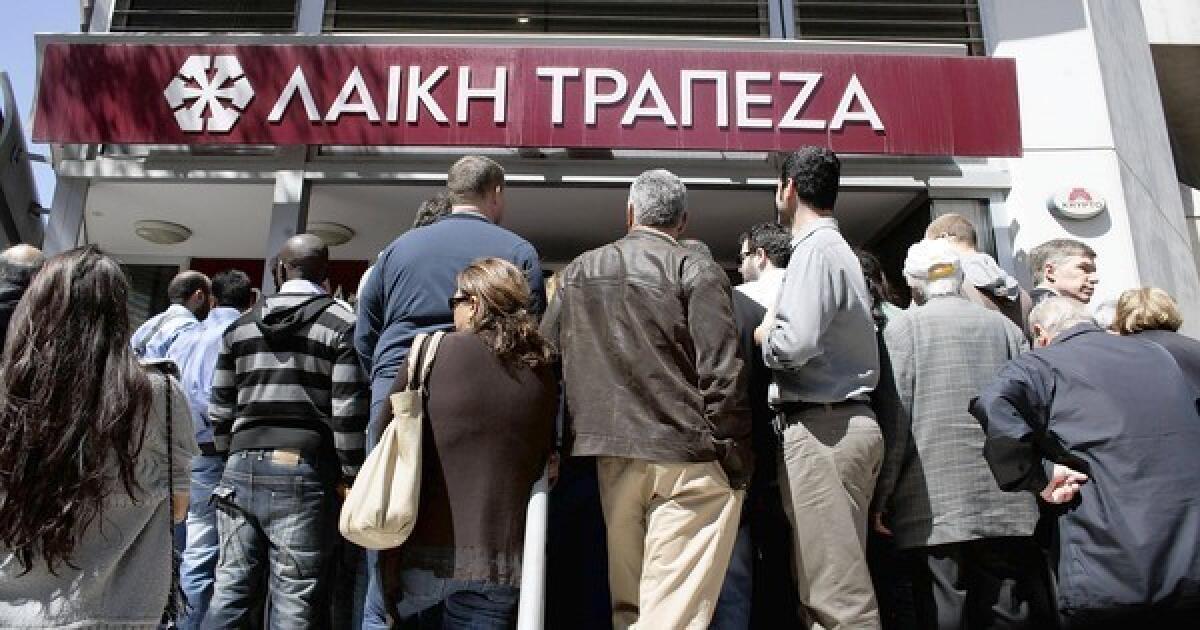Cyprus remains calm as banks reopen

ATHENS â Despite widespread fear of panic and protests, Cyprusâ cash-starved banks reopened Thursday, allowing customers to access their accounts under stiff regulations mandated by a harsh bailout plan that has raised questions about Europeâs latest approach to financial-crisis management.
Officialsâ anxiety proved unfounded, however, as not a single incident was reported throughout the day.
Cypriots had been locked out of their accounts for nearly two weeks as the conservative-led government negotiated a controversial bailout scheme that secured a $20.5-billion international lifeline for the tiny Mediterranean island in exchange for a surprise swoop on bank accounts to cover for about a third of the rescue package.
Fierce public reaction scrapped the initial plan. But as the prospect of an imminent default grew, and with it the republicâs exit from the Eurozone, Cyprus approved a revised deal this week allowing hefty levies on bank deposits over $128,000.
Fear of a depositor stampede draining accounts spurred the deployment of hundreds of state and private guards across the capital, Nicosia. Hospitals, doctors and firefighters were also put on alert.
Yet as clocks struck noon and bank doors opened, Cypriots seemed resigned to their new reality. Standing stoically on the sun-kissed streets of the capital and under the glaring spotlight of foreign media, they filed into orderly queues outside banks, waiting for hours to access their savings and withdraw limited amounts.
âI feel a sense of fear and disappointment having to queue up like this; it feels like a Third World country. But what can you do?â 64-year-old pensioner Froso Kokikou told Reuters news service. âThis is what they imposed on us and we have to live with it.â
Central bank officials contacted by telephone refused to disclose the total amount of withdrawals Thursday. But fear of capital flight persists, they said, despite severe regulations decreed by the government this week.
Under those restrictions, depositors are limited to $384 in cash withdrawals each day. A cap of $6,300 on transactions with other countries has also been set for accounts. Cashing checks has been banned.
Cyprusâ Finance Ministry said the capital controls will be in place for seven days, but many analysts believe they will last longer.
âThis is a typical set of exchange-control measures, more reminiscent of Latin America or Africa,â said Bob Lyddon, general secretary of the international banking association IBOS.
âThere is no way these will only last seven days,â he said. âThese are permanent controls until the economy recovers.â
Of the 17 nations that use the euro currency, Cyprus is the first to bring in capital controls. Even so, the restriction on the free movement of capital and the tapping of bank accounts mark profound breaches of the rules of a group that is bent on defending a unified currency.
These latest actions have raised the question of whether Europe may be pushing for new rules and setting new precedents for financial rescues.
Dutch Finance Minister Jeroen Dijsselbloem suggested this week that Cyprusâ bailout could serve as a template for future economic crises on the continent.
Although the Dutch official issued a clarification hours later, his remarks weakened faith in the euro and damaged confidence in other European banks.
And as bank shares swooned, analysts and concerned investors wondered whether a euro deposited in Cypriot banks could be worth less than one deposited elsewhere.
Economists and a number of European leaders have been pushing for confirmation that the measures taken in Cyprus would not be part of Europeâs crisis-management tool kit.
As the islandâs banks reopened, the European Commission said that while the imposed capital controls were âlegal and justified,â they were also âstrictly temporary.â
With fewer than 1 million people and an economy about the size of Vermontâs, Cyprus has about $88 billion in its banks, a vastly outsized financial system that is eight times the size of the island nationâs economic output. The system took a serious hit after bond investments in Greece went sour because of its financial crisis.
Under the bailout deal, Cyprusâ two biggest and most indebted lenders will face a rigorous restructuring that shrinks the islandâs banking sector and will cost thousands of jobs, pushing the nation deeper into recession.
To meet depositorsâ demands and to be sure that enough cash was on hand, the European Central Bank sent a special aircraft to Cyprus with a cargo of currency worth $6.3 billion, according to local news reports.
Although the Frankfurt-based ECB did not comment on those reports, officials privately acknowledged that the institution would maintain the stock of cash for deposit accounts.
Carassava is a special corespondent.
More to Read
Sign up for Essential California
The most important California stories and recommendations in your inbox every morning.
You may occasionally receive promotional content from the Los Angeles Times.










